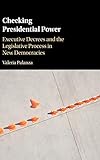Checking presidential power : executive decrees and the legislative process in new democracies
Material type: TextPublication details: Cambridge CUP 2019Description: 245pISBN: 9781108427623Subject(s): Presidents Separation of powers Executive power Democracy Delegated legislationDDC classification: 321.8042 Summary:
A central concern about the robustness of democratic rule in new democracies is the concentration of power in the executive branch and the potential this creates for abuse. This concern is felt particularly with regard to the concentration of legislative power. Checking Presidential Power explains the levels of reliance on executive decrees in a comparative perspective. Building on the idea of institutional commitment, which affects the enforcement of decision-making rules, Palanza describes the degree to which countries rely on executive decree authority as more reliance may lead to unbalanced presidential systems and will ultimately affect democratic quality. Breaking new ground by both theorizing and empirically analyzing decree authority from a comparative perspective, this book examines policy making in separation of powers systems. It explains the choice between decrees and statutes, and why legislators are sometimes profoundly engaged in the legislative process and yet other times entirely withdrawn from it.
TextPublication details: Cambridge CUP 2019Description: 245pISBN: 9781108427623Subject(s): Presidents Separation of powers Executive power Democracy Delegated legislationDDC classification: 321.8042 Summary:
A central concern about the robustness of democratic rule in new democracies is the concentration of power in the executive branch and the potential this creates for abuse. This concern is felt particularly with regard to the concentration of legislative power. Checking Presidential Power explains the levels of reliance on executive decrees in a comparative perspective. Building on the idea of institutional commitment, which affects the enforcement of decision-making rules, Palanza describes the degree to which countries rely on executive decree authority as more reliance may lead to unbalanced presidential systems and will ultimately affect democratic quality. Breaking new ground by both theorizing and empirically analyzing decree authority from a comparative perspective, this book examines policy making in separation of powers systems. It explains the choice between decrees and statutes, and why legislators are sometimes profoundly engaged in the legislative process and yet other times entirely withdrawn from it.
| Item type | Current library | Call number | Status | Date due | Barcode |
|---|---|---|---|---|---|
 BK
BK
|
Stack | 321.8042 PAL/C (Browse shelf (Opens below)) | Available | 51207 |
A central concern about the robustness of democratic rule in new democracies is the concentration of power in the executive branch and the potential this creates for abuse. This concern is felt particularly with regard to the concentration of legislative power. Checking Presidential Power explains the levels of reliance on executive decrees in a comparative perspective. Building on the idea of institutional commitment, which affects the enforcement of decision-making rules, Palanza describes the degree to which countries rely on executive decree authority as more reliance may lead to unbalanced presidential systems and will ultimately affect democratic quality. Breaking new ground by both theorizing and empirically analyzing decree authority from a comparative perspective, this book examines policy making in separation of powers systems. It explains the choice between decrees and statutes, and why legislators are sometimes profoundly engaged in the legislative process and yet other times entirely withdrawn from it.


There are no comments on this title.